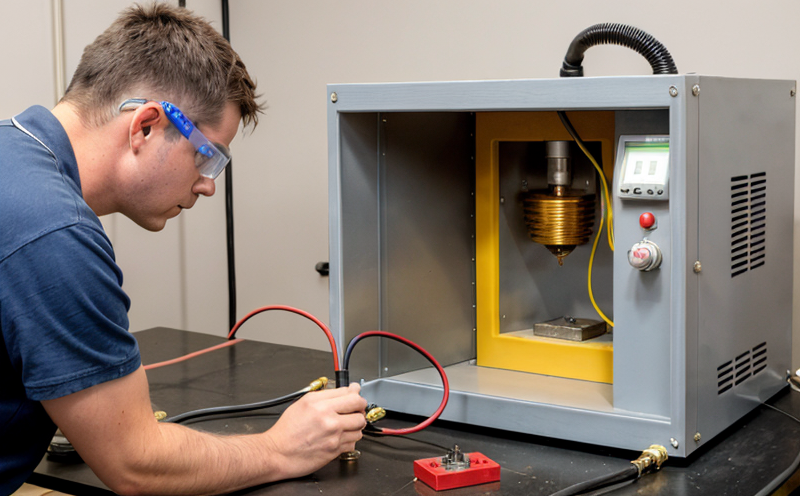ASTM A773 Hysteresis Testing of Iron Alloys
The ASTM A773 standard is widely recognized in the metallurgical and materials testing sectors for its detailed methodology to determine hysteresis loss in iron alloys. This service focuses on the accurate measurement of magnetic properties, specifically hysteresis, which plays a crucial role in understanding the behavior of ferromagnetic materials under cyclic magnetic fields.
Hysteresis is an essential parameter in assessing the quality and performance of iron alloys as it reflects the energy dissipation during magnetization processes. This testing service ensures that manufacturers can accurately quantify hysteresis, which directly impacts the efficiency and durability of electrical components such as transformers, motors, and generators.
ASTM A773 specifies a procedure for measuring magnetic hysteresis using an alternating magnetic field method. The standard is applicable to iron-based alloys, including but not limited to carbon steel, stainless steel, and other ferromagnetic materials used in various industrial applications. This service ensures compliance with international standards, thereby enhancing the reliability of products across different sectors.
The testing process involves meticulous specimen preparation, precise calibration of instruments, and adherence to strict environmental conditions to ensure accurate results. Specimens are typically prepared by cutting from larger ingots or castings, ensuring that they represent a cross-section of the material's properties. The specimens are then subjected to controlled magnetic fields in an environment free from external influences.
The hysteresis loop is visualized on a plot with the applied and induced magnetic flux densities as coordinates. This graphical representation allows for precise quantification of energy losses during magnetization cycles, which are critical for evaluating the material's performance under cyclic loading conditions. Understanding these properties helps in optimizing designs and selecting suitable materials for specific applications.
Our laboratory adheres strictly to ASTM A773 guidelines to ensure that testing is not only accurate but also reproducible. This service provides reliable data that can be used for quality assurance, research and development, and compliance with regulatory requirements. The results obtained from this test are essential for industries ranging from automotive manufacturing to electrical engineering.
By leveraging our advanced equipment and experienced personnel, we offer a comprehensive testing service that meets the highest industry standards. Our clients benefit from detailed reports that not only present the hysteresis data but also provide insights into how these properties affect material performance in real-world applications.
Quality and Reliability Assurance
The ASTM A773 Hysteresis Testing service is integral to our commitment to quality and reliability assurance. By adhering strictly to the standard’s guidelines, we ensure that every test conducted meets the highest industry standards. This precision is crucial for maintaining the integrity of materials used in critical applications.
Our testing process includes stringent specimen preparation, meticulous calibration of instruments, and adherence to strict environmental conditions to ensure accurate results. These measures are vital for producing reliable data that can be trusted by quality managers, compliance officers, R&D engineers, and procurement teams.
The reliability of the test results is further enhanced through our state-of-the-art equipment and highly skilled personnel. This combination ensures not only accuracy but also repeatability, which is essential in maintaining consistent product performance across batches or production runs.
By providing accurate hysteresis data, we support manufacturers in achieving their quality objectives. Our service helps in identifying areas for improvement, ensuring that products meet the required specifications and exceed customer expectations. This commitment to excellence extends beyond compliance with ASTM A773; it includes a focus on continuous improvement and innovation.
Environmental and Sustainability Contributions
The ASTM A773 Hysteresis Testing service also contributes positively to environmental sustainability by ensuring that materials used in critical applications are of the highest quality. High-quality iron alloys, as assessed through this testing method, contribute to more efficient electrical components, which in turn reduce energy consumption and environmental impact.
By optimizing material selection and design based on accurate hysteresis data, manufacturers can produce products with improved performance and reduced waste. This aligns with broader sustainability goals by promoting the use of materials that are both durable and energy-efficient.
The testing process itself is conducted in a manner that minimizes environmental impact. Our laboratory adheres to best practices for minimizing waste and optimizing resource usage, ensuring that every aspect of our operations contributes positively to sustainability efforts.
Through this service, we not only enhance the performance of materials used in various industries but also contribute to more sustainable manufacturing processes. By providing reliable data on hysteresis loss, we enable manufacturers to make informed decisions that have a positive environmental impact.
Competitive Advantage and Market Impact
- Accurate measurement of magnetic properties ensures product reliability and performance.
- Compliance with ASTM A773 enhances brand reputation and customer trust.
- Data-driven decision-making supports continuous improvement in material selection and design.
- Precision testing provides a competitive edge by ensuring superior product quality.
The ASTM A773 Hysteresis Testing service is not just about meeting standards; it’s about providing the most accurate data possible to inform critical decisions. This service gives our clients the edge they need in an increasingly competitive market, where reliability and performance are paramount.
By leveraging this testing method, manufacturers can stay ahead of industry trends, ensuring that their products meet not only current standards but also future requirements. The insights gained from accurate hysteresis data contribute to innovation and differentiation in the marketplace, positioning our clients for long-term success.





